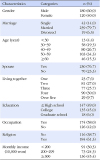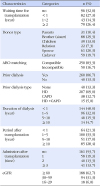|
|
| 1. |
Dong CJ, Nam HK, Seoun WL, Jong SL, Sung RY, Bung SK. DCurrent renal replacement therapy in Korea. The Korean Journal of Nephrology 2013;33:7–34.
|
|
| 2. |
Jeong KH, Lee YJ, Park JE, Oh WT, Lee YJ, Moon JY, et al. Factors predicting long-term graft survival after kidney transplantation. The Korean Journal of Nephrology 2006;25(4):613–620.
|
|
| 3. |
Korean Network for Organ Sharing. Annual report of the transplant 2012[Internet]. Seoul: 2014 [cited 2015 January 01].
|
|
| 4. |
Alexandre GP, Squifflet JP, De Bruyere M, Latinne D, Reading R, Gianello P, et al. Present experiences in a series of 26 ABO-incompatible living donor renal allografts. Transplant proceedings 1987;19(6):4538–4542.
|
|
| 5. |
Park PK, Kown OJ, Kang CM. The impact of elderly donor in renal transplantation. The Korean Society for Transplantation 2008;22:66–69.
|
|
| 6. |
Fadili W, Allah MH, Laouad I. Chronic renal allograft dysfunction: risk factors, immunology and prevention. Arab Journal of Nephrology and Transplantation 2013;6(1):45–50.
|
|
| 7. |
Jeon KO, Kim MS, Kim YS, Nam JM, Huh KH, Kim SI, et al. Analysis of risk factors affecting the graft survival in living unrelated donor kidney transplantation. The Korean Society for Transplantation 2004;18(2):155–163.
|
|
| 8. |
Ryu JH, Kim MH, Kang IS. A study on the compliance and educational demand of renal transplantation patient. The Korean Journal of Rehabilitation Nursing 2003;6(2):226–238.
|
|
| 9. |
Son WY, Hyun SJ, Kim NM, Eum OJ, Kim CG, Kim DJ, et al. The effect of compliance, family support and graft function on quality of life in kidney transplant recipients. The Korean Society for Transplantation. 2008;22(2):254–261.
|
|
| 10. |
Gheith OA, EL-Saadany SA, Donia SAA, Salem YM. Compliance of kidney transplant patients to the recommended lifestyle behaviours: single centre experience. International Journal of Nursing Practice 2008;14:398–407. [doi: 10.1111/j.1440-172x.2008.00710.x]
|
|
| 11. |
Kobus G, Malyszko J, Malyszko JS, Puza E, Gajewska B, Mysliwiec M. Compliance with lifestyle recommendation in kidney allograft recipients. Transplantation Proceedings 2011;43:2930–2934. [doi: 10.1016/j.transproceed.2011.08.031]
|
|
| 12. |
Koo TY, Park HS, Kim HC, Park JS, Lee CH, Kim GH, et al. Infectious complications in patients with kidney transplantation: follow-up results in single center. The Korean Society for Transplantation 2008;22(1):77–84.
|
|
| 13. |
Gaynor JJ, Ciancio G, Guerra G, Sageshima J, Hanson L, Roth D, et al. Graft failure due to noncompliance among 628 kidney transplant recipients with long-term follow-up: a single-center observational study. Transplantation 2014;97(9):925–933. [doi: 10.1097/01.tp.0000438199.76531.4a]
|
|
| 14. |
Kim MH, Kim MS, Kwon OJ, Kang CM. Comparison of quality of life between kidney transplant patients and dialysis patients. The Korean Society for Transplantation 2009;23(1):65–70.
|
|
| 15. |
Weng LC, Dai YT, Wang YW, Huang HL, Chiang YJ. Effects of self-efficacy, self-care behaviours on depressive symptom of Taiwanese kidney transplant recipients. Journal of Clinical Nursing 2008;17(13):1786–1794. [doi: 10.1111/j.1365-2702.2007.02035.x]
|
|
| 16. |
Ahn JH. The effect of the self efficacy promotion and exercise training program of kidney transplant recipients. Journal of Korean Academy Nursing 2000;30(5):1181–1194.
|
|
| 17. |
Urstad KH, Oyen O, Andersen MH, Moum T, Wahl AK. The effect of an educational intervention for renal recipients: a randomized controlled trial. Clinical Transplantation 2012;26:E246–E253. [doi: 10.1111/j.1399-0012.2012.01666.x]
|
|
| 18. |
Benight CC, Bandura A. Social cognitive theory of posttraumatic recovery: the role of perceived self-efficacy. Behaviour Research and Therapy 2004;42(10):1129–1148. [doi: 10.1016/j.brat.2003.08.008]
|
|
| 19. |
Lindqvist R, Carlsson M, Sjoden PO. Coping strategies of people with kidney transplants. Journal of Advanced Nursing 2004;45(1):47–52. [doi: 10.1046/j.1365-2648.2003.02859.x]
|
|
| 20. |
Gill P. Stressors and coping mechanism in live-related renal transplantation. Journal of Clinical Nursing 2012;21:1622–1631. [doi: 10.1111/j.1365-2702.2012.04085.x]
|
|
| 21. |
Liu H, Feurer ID, Dwyer K, Shaffer D, Pinson CW. Effects of clinical factors on psychosocial variables in renal transplant recipients. Journal of Advanced Nursing 2009;65(12):2585–2596. [doi: 10.1111/j.1365-2648.2009.05111.x]
|
|
| 22. |
Chen KH, Weng LC, Lee S. Stress and stress-related factors of patients after renal transplantation in Taiwan: a cross-sectional study. Journal of Clinical Nursing 2010;19:2539–2547. [doi: 10.1111/j.1365-2702.2009.03175.x]
|
|
| 23. |
Yang J. ABO incompatible kidney transplantation. The Korean Journal of Nephrology 2011;30:355–358.
|
|
| 24. |
White C, Gallagher P. Effect of patient coping preferences on quality of life following renal transplantation. Journal of Advanced Nursing 2010;66(11):2550–2559. [doi: 10.1111/j.1365-2648.2010.05410.x]
|
|
| 25. |
Kim DH, Kang SW, Ko KI, Kim CH, Lee JH, Lee JH, et al. Comparison of various methods for estimating Glomerular Filtration Rate in patients with chronic kidney disease. The Korean Journal of Nephrology 2008;27:560–568.
|
|
| 26. |
Bandura A. In: The social foundations of thought & action: a social cognitive theory. New Jersey: PrenticeHall; 1985.
|
|
| 27. |
Lazaus RS, Folkman S. In: Stress, Appraisal and Coping. New York: Springer; 1984.
|
|
| 28. |
Jalowiec A, Murphy SP, Powers MJ. Psychometric assessment of the Jalowiec coping scale. Nursing Research 1984;33(3):157–161. [doi: 10.1097/00006199-198405000-00008]
|
|
| 29. |
Whang YO. In: The study of coping behavior of the heart transplant recipients-focused on the relation of stress, coping behavior, and quality of life[dissertation]. Seoul: Ewha Womans University; 2004. pp. 1-167.
|
|
| 30. |
Weng LC, Dai YT, Huang HL, Chiang YJ. Self-efficacy, self-care behaviours and quality of life of kidney transplant recipients. Journal of Advanced Nursing 2010;66(4):828–838. [doi: 10.1111/j.1365-2648.2009.05243.x]
|
|
| 31. |
Germani G, Lazzaro S, Gnoato F, Senzolo M, Borella V, Rupolo U, et al. Nonadherent behaviors after solid organ transplantation. Transplantation Proceedings 2011;43(1):318–323. [doi: 10.1016/j.transproceed.2010.09.103]
|
|
| 32. |
Oh SH, Yoo EK. Comparison of quality of life between kidney transplant and hemodialysis patients. Journal of Korean Academy Nursing 2006;36(7):1145–1153.
|
|
| 33. |
Lin SY, Fetzer SJ, Lee PC, Chen CH. Predicting adherence to health care recommendations using health promotion behaviours in kidney transplant recipients within 1-5 years post-transplant. Journal of Clinical Nursing 2011;20:3313–3321. [doi: 10.1111/j.1365-2702.2011.03757.x]
|
|
| 34. |
Yavuz A, Tuncer M, Erdogan O, Gurkan A, Cetinkaya R, Akbas SH, et al. Is there any effect of compliance on clinical parameters of renal transplant recipient? Transplantation proceedings 2004;36(1):120–121. [doi: 10.1016/j.transproceed.2003.11.052]
|
|




 ePub
ePub Citation
Citation Print
Print






